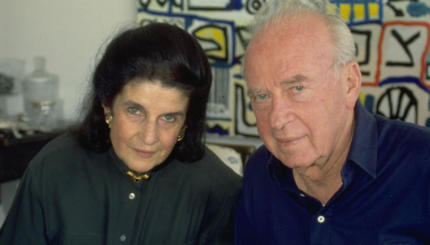With the recent violence and escalation in the Middle East, my mind is on Israel. With every report of a rocket falling or a siren blaring, my heart skips a beat. It’s so close to home.
I spent last year studying at the Pardes Institute of Jewish Studies, while living in Jerusalem. I have close friends and family in Israel right now, and feel a deep sense of sadness and worry for what they are living through.
And my friends are not all Israeli.
While in Israel, I volunteered with organizations such as Rabbis for Human Rights and Encounter. These experiences led me to make meaningful connections with young Palestinians living in the West Bank and in East Jerusalem. I want to tell you about one of my friends. I want to share her story, because I believe that it’s important to make room for voices to be heard.
Haya and I met about six months ago, when I participated in an Encounter trip to the West Bank. She was speaking on a panel, and talked about the politics of being a young woman living in Hebron. We chatted for a while after the panel, a little about politics but mostly about college and Miley Cyrus. Haya is currently studying English literature at the University of Hebron.
I visited Haya a few times after we met. She showed me around Hebron, and her University. I met her friends and she took me to her favorite shops in town. When I heard news that the IDF was looking for the men that abducted and killed three young students in and around Hebron, I reached out to her. I heard several reports of house demolitions, road blocks, curfews, and so on, but I wasn’t really certain what was happening on the ground.
She lives in a suburb of Hebron, so I didn’t really think anything would be bad in her immediate proximity. Her family is middle-class, and they are all peace activists. Her parents came to the same discussion I met Haya at, and stayed for dinner after. Her father, a small and joyful man, asked me if I had any Palestinian friends in Jerusalem. I told him no. Immediately, brimming with excitement, he responded, “Now you have one!”
So as this latest escalation of tensions began, I texted Haya: “Are you okay?”
All she responded, after moments of typing back was, “Not really.”
I pushed her: “What’s going on?”
“There are settlers and soldiers everywhere. They closed all the entrances and exits.” She was confined to her house. Then after moments of silence, she added, “It’s going to be a tough night.”
She continued to tell me about how the soldiers searched her neighbor’s house, that they were searching all the houses in the neighborhood, that hers was probably next. That she was afraid. Then the tear gas came and she described the smell to me, and how even though she was inside the smell was so strong. She said, “I hate it.”
I tried to imagine smelling tear gas in my own home. I cringed. I couldn’t really imagine it.
Haya and I are a similar age, have the same taste in music, watch the same TV shows, have friends in common. Yet we are worlds apart. I listened as she told me about the soldiers that would forcefully enter her house and ransack it. I tried to imagine what that would feel like. As we work towards a better future, one filled with peace and lovingkindness, we must reach out to those unknown to us and listen to their stories attentively. We must share our own in return. In the words of Henry David Thoreau, “Could a greater miracle take place than or us to look through each other’s eye for an instant?”
This notion is a Jewish one, too. Pirkei Avot 6:5 teaches us “Torah is acquired by means of 48 qualities [including] attentive listening, articulate speech, intuitive understanding…deliberation… asking and answering, listening, and contributing to the discussion.” As we continue to pray for the safety of friends and family in Israel, it’s important to remain open to hearing personal narratives. These stories are what help make the events “real,” and allow us to see the real life people impacted by conflict on a daily basis.
Let us listen to these narratives, value these friendships, and pray for peace for everyone. Everyone.
Moved by this post? Join the conversation through MyJewishLearning’s weekly blogs newsletter.
Avot
Pronounced: ah-VOTE, Origin: Hebrew, fathers or parents, usually refering to the biblical Patriarchs.



